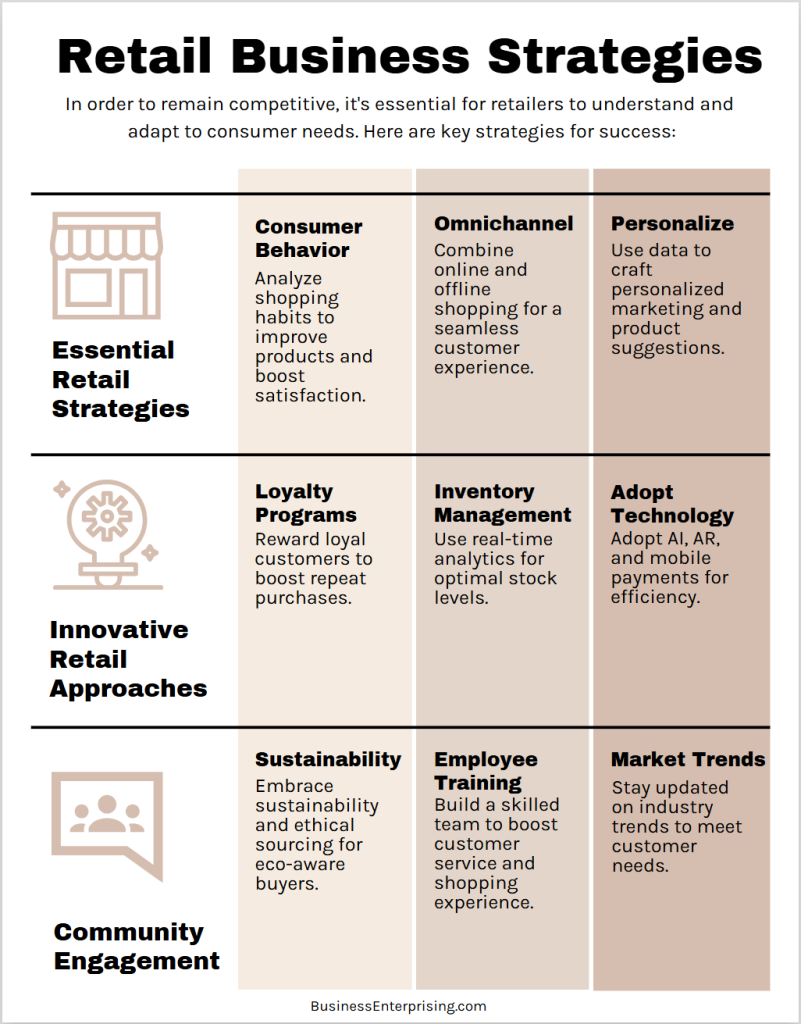
To build a strong foundation, you need to understand consumer behavior and market dynamics. Additionally, integrating innovation into your operations can enhance the shopping experience and streamline processes. These approaches not only support growth but also help differentiate your brand in a crowded marketplace.
By focusing on areas like sustainability, personalization, and omnichannel retailing, you can create meaningful connections with your customers. Therefore, refining your retail business strategies is not just a choice—it’s an opportunity to grow and thrive.
Understanding Consumer Behavior
Understanding consumer behavior is essential for developing effective retail business strategies. By analyzing how customers make purchasing decisions, you can tailor your offerings to meet their needs. This approach not only enhances customer satisfaction but also boosts your competitive edge.
Consumer preferences and purchasing patterns significantly influence retail strategies. For instance, the rise of e-commerce has shifted many shoppers toward online platforms. Therefore, integrating online and offline experiences can capture a broader audience. Additionally, the growing demand for personalized shopping experiences means that retailers should consider customizing their services to individual customer preferences.
Market research plays a pivotal role in understanding these consumer behaviors. By gathering and analyzing data on customer preferences, you can identify emerging trends and adjust your product offerings accordingly. For example, if research indicates a shift toward sustainable products, stocking eco-friendly items can meet this demand. Moreover, staying attuned to changing trends allows you to remain relevant in a dynamic market.
Adapting to these changes is not just beneficial but necessary. Retailers who proactively respond to evolving consumer behaviors are more likely to thrive. Conversely, those who ignore these shifts risk losing market share to more agile competitors. Therefore, continuous market research and flexibility in strategy are key components of success in the retail industry.
Leveraging Omnichannel Retailing
Integrating online and offline channels is a key component of effective retail business strategies. By leveraging omnichannel retailing, you can create a cohesive customer experience. This approach allows customers to interact with your brand seamlessly, regardless of how or where they shop.
The benefits of omnichannel retailing extend beyond convenience. For example, combining online shopping with in-store pickup caters to customers seeking speed and flexibility. Additionally, offering consistent pricing, promotions, and inventory availability across channels builds trust. These elements work together to enhance customer satisfaction and loyalty.
To create a seamless experience, focus on aligning your digital and physical touchpoints. For instance, ensure your website reflects real-time store inventory to reduce frustration. Furthermore, integrating customer data from all channels helps you personalize communication and recommendations. These strategies make interactions smoother and more meaningful.
Adopting omnichannel retailing requires collaboration and continuous improvement. Regularly assess how your channels perform and adapt to customer preferences. By doing so, you’ll strengthen your retail business strategies and remain competitive in a rapidly evolving market.
Personalization and Customer Engagement
Personalization is a cornerstone of effective retail business strategies. By tailoring the shopping experience, you can build stronger connections with your customers. Data-driven approaches allow you to understand preferences and behaviors, helping you offer products and services that feel relevant and timely.
Using customer data is key to creating personalized interactions. For instance, analyzing purchase history enables you to recommend items that match individual tastes. Additionally, segmenting customers based on demographics or past behaviors helps you target marketing campaigns more effectively. These techniques make your customers feel valued and understood.
Loyalty programs are another powerful way to enhance engagement. Offering rewards for repeat purchases encourages customers to keep coming back. Moreover, incorporating personalization into loyalty programs, like exclusive offers based on shopping habits, can further strengthen their impact. These efforts not only increase satisfaction but also foster long-term relationships.
Personalized marketing campaigns also play a critical role in customer engagement. For example, sending tailored email offers or ads that align with customer preferences can drive conversions. When combined with consistent communication, these strategies help you maintain visibility and build trust. By focusing on personalization, you can refine your retail business strategies and drive meaningful growth.
Inventory Management and Supply Chain Optimization
Efficient inventory management is an important part of effective retail business strategies. By maintaining optimal stock levels, you can minimize costs while meeting customer demand. However, achieving this balance requires planning and monitoring inventory data to prevent overstocking or shortages.
To maintain efficiency, focus on tracking inventory in real time. Using technology like inventory management software allows you to identify trends and make timely adjustments. Additionally, analyzing sales data helps you anticipate seasonal fluctuations or popular products. These practices enable you to respond proactively to changes in demand.
Improving supply chain resilience is another way to reduce costs and enhance operations. Partnering with reliable suppliers and diversifying sourcing options can mitigate risks. For instance, having multiple suppliers reduces dependency on a single source. Furthermore, streamlining transportation routes and consolidating shipments can lower logistics expenses while improving delivery speed.
Optimizing both inventory and supply chains supports your overall business goals. Regularly reviewing these processes ensures they align with customer needs and market conditions. By incorporating these strategies into your retail business strategies, you can improve efficiency, reduce waste, and build a more adaptable operation.
Adapting to Technology and Innovation
Adapting to new technology is a key element of successful retail business strategies. Emerging tools like AI, AR, and mobile payments are reshaping how retailers interact with customers. These technologies provide new ways to improve efficiency and enhance the shopping experience.
AI plays a significant role by analyzing customer data to deliver personalized recommendations. Additionally, it helps automate inventory management and predict demand trends. Augmented reality (AR) offers a unique way for customers to visualize products before purchasing. For example, virtual try-ons or in-home previews can reduce uncertainty and boost confidence in their decisions.
Mobile payments have also become a critical aspect of modern retail. They provide customers with faster, more convenient transactions. Therefore, integrating these systems into your operations improves the overall shopping experience. Furthermore, embracing these innovations demonstrates a commitment to staying relevant and customer-focused.
To remain competitive, you must continuously assess emerging technologies and adapt your strategies. For instance, monitoring industry trends can help you identify which tools align with your goals. Regularly investing in innovation ensures that your business meets changing customer expectations. By incorporating technology into your retail business strategies, you can build a more agile and future-ready operation.
Sustainability and Ethical Practices
Sustainability and ethical practices are becoming essential components of retail business strategies. Consumers increasingly value brands that prioritize eco-friendly and socially responsible operations. Therefore, adopting sustainable practices helps you meet customer expectations and build a stronger connection with your audience.
Eco-friendly retailing involves reducing waste, using sustainable materials, and supporting green initiatives. For example, offering reusable packaging or sourcing from ethical suppliers demonstrates your commitment to the environment. Additionally, showcasing these efforts transparently can influence customer perception and attract environmentally conscious shoppers.
Social responsibility also plays a significant role in shaping your brand’s reputation. By supporting fair labor practices and community initiatives, you show that your business cares about more than profits. These actions not only reflect positively on your company but also encourage loyalty among customers who share similar values.
Sustainable practices enhance brand value and create long-term benefits for your business. When customers see your commitment to ethical retailing, they are more likely to choose your products. Incorporating sustainability into your retail business strategies not only aligns with current trends but also sets you apart in a competitive market.
Conclusion
Effective retail business strategies are essential for thriving in a competitive market. By understanding customer needs, you can tailor experiences that build trust. Additionally, leveraging technology and innovation helps you stay ahead and deliver convenience.
Sustainability and ethical practices are increasingly important to customers. Therefore, adopting environmentally friendly and socially responsible approaches strengthens your brand and fosters loyalty. These efforts show your commitment to positive change and resonate with values shared by your audience.
Adapting your strategies to align with evolving trends ensures continued success. By focusing on innovation, personalization, and sustainability, you create meaningful connections with your customers. Retail business strategies built on these principles position your business for long-term growth and relevance.



